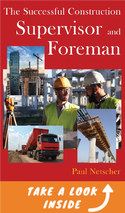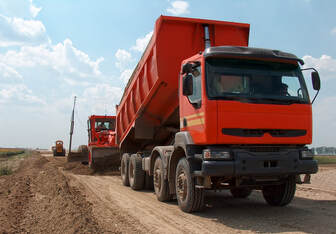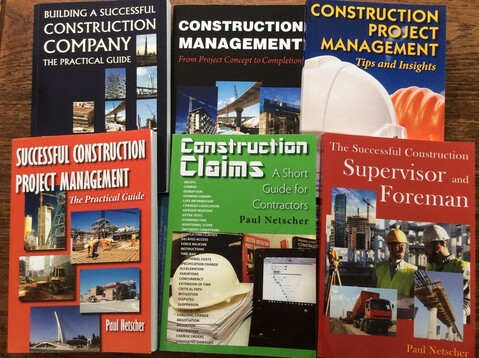Save money by checking construction equipment when it arrives on the projectWhen equipment arrives on your construction project it’s important to check for scratches and damages. Remember that the owner/hirer will expect the item to be returned in good condition. You need to report all damages, including cracked and chipped windows and lights. Your construction project will probably be charged for all damages on the equipment unless you reported and recorded them when the item arrived. Of course reporting damage means reporting it in writing – unfortunately people forget verbal conversations. Taking photographs of damage is an effective way of recording the extent of pre-existing damages. Check that the item works correctly, that it has all the necessary licenses and paperwork and that where necessary it’s roadworthy. Check the condition of tyres – badly worn tyres are dangerous and they can be more easily punctured or spring leaks, which will cause disruption while they’re repaired. Check the condition of cutting edges, blades and excavator bucket teeth. Badly worn cutting edges will reduce productivity and cut less easily. But generally construction equipment hire companies charge for replacing cutting edges. You don’t want to receive construction equipment with badly worn parts which wear out completely after a few days and then your project is charged for a replacement new item. On large machines these items can cost hundreds and even thousands of dollars. Check for oil and fuel leaks. Check that the machine has arrived with all the parts and components it’s supposed to have. For instance, hired vehicles would normally have a spare wheel, a lifting jack, warning triangles and maybe some tools. If the vehicle is returned without these items the construction project will be charged for them. It’s not fair to be charged for items that the project never received, so ensure that missing items are recorded when the equipment arrives. It’s important to check and record the quantity of fuel in vehicles and large construction equipment. Construction equipment hire companies generally expect the equipment to be returned fully fuelled and if the item isn’t full they’ll charge the project to fill the machine or vehicle with fuel. Now if the item was empty when it arrived that could be lots of fuel you’re paying for. The average vehicle might have a 50 litre (13 gallon) fuel tank, but a large construction truck or bulldozer could have a 200 litre (50 gallons) or bigger tank. Why would you donate a tank of fuel to the hire company? Always record the time the equipment arrived on the project. If the item arrives at say 4pm you wouldn’t want construction project to be charged the hire for that day. The project shouldn’t be paying for hours when the item wasn’t on the project. In fact, any delivery 4 hours or less from the end of the day shouldn’t be charged to the project on that day, because it’s unlikely that you’ll get the equipment setup and working before the day’s finished. It’s also important to record when there’re missing items and paperwork which prevent the equipment from being used. The project should only pay for the item when it’s fit to use for the purpose that it was hired for. Even when the equipment belongs to your company it’s good practice to carry out the same checks. Many contractors charge the project a rate (hire) to use company owned equipment. Normally the project also has to pay for new tyres, cutting edges and to repair damages for company equipment.  This is an extract from the author's book 'The Successful Construction Supervisor and Foreman' available from Amazon and other online bookstores. On reader on Amazon said "Honestly, this book is damn readable. It's more practical than I thought. It's can be called "concise construction management manual". It should be read by all kind of construction professionals. The author is simply a great construction professional. I am really appreciate him. Keep calm and read more book by Paul Netscher!" Do you want to learn how to manage construction projects successfully?Paul Netscher has written several easy to read books for owners, contractors, construction managers, construction supervisors and foremen. They cover all aspects of construction management and are filled with tips and insights.
Visit to read more. The books are available in paper and ebook from most online stores including Amazon. © 2020 This article is not to be reproduced for commercial purposes without written permission from the author. construction management construction project management
1 Comment
20/2/2023 11:13:20 am
Thank you for mentioning that you should double-check that the machine has all the parts and components it should have. I don't have a spare wheel for my large construction machine. I'll advise her to get a wheel from a heavy equipment spare parts retailer.
Reply
Leave a Reply. |
Archives
June 2024
Note: We welcome genuine comments, especially comments that add additional information to the subject matter in the article. We however reserve the right to remove inappropriate comments, which includes comments that have nothing to do with the subject, comments that include inappropriate language, and comments that are an advertisement for a product or company, or which include an advertising link. Comments must be in English. We will not enter into discussion on why a particular comment was removed.
CategoriesCopyright 2016 - The attached articles cannot be reproduced for commercial purposes without the consent of the author.
The opinions expressed in the attached articles are those of the writer. It should be noted that projects are varied and different laws and restrictions apply which depend on the location of the contractor and the project. It's important that the reader uses the supplied information taking cognisance of their particular circumstances. The writer assumes no responsibility or liability for any loss of any kind arising from the reader using the information or advice contained herein. "I have what I consider some of the best books on construction management."
Books are available from: Amazon.com Amazon.co.uk takealot.com kalahari.com Amazon.in Amazon.de Amazon.fr Amazon.it Amazon.com.au Powell's Fishpond uread bokus Amazon.ca Amazon.es Other retail stores Available in paperback or on Kindle "28 YEARS OF CONSTRUCTION PROJECT MANAGEMENT EXPERIENCE, DEVELOPING SUCCESSFUL CONSTRUCTION PROJECT MANAGERS AND BUILDING SUCCESSFUL CONSTRUCTION COMPANIES"
|





 RSS Feed
RSS Feed




